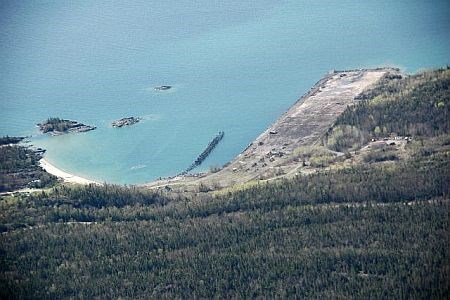The proponent behind a Lake Superior trap rock open pit mine could begin carving out a granite quarry this year if a new joint venture partner is secured.
Bruce Staines, mine manager of Superior Aggregates Inc., said once his Michigan-based parent company, the Carlos Group, settles on a partner, very little is likely to happen on the quarry and upgrades to a nearby commercial dock.
Though unclear about the status of the partner search, he was expecting to get an update from company officials at the upcoming Ontario, Stone, Sand and Gravel Association annual general meeting in Toronto, Feb. 17-19.
“I'll be a lot smarter after that,” joked Staines, who added no site preparation work has started for the quarry, nor any upgrades to an adjacent commercial dock in Michipicoten Bay on the east shore of Lake Superior.
The conference is considered one of the biggest networking events in the aggregate industry and is attended by the likes of Lafarge and St. Marys Cement Group.
Superior Aggregates is a subsidiary of the Carlo Companies, a Detroit-area civil construction, transportation and land development firm.
The firm is well-known as a builder of super highways in the U.S. Staines said a potential new partner would have expertise in marketing, logistics and distribution.
Trap rock is not geological term but refers to any igneous rock quarried and crushed to make aggregate for highway and railroad construction, and as an ingredient in making cement. Depending on the economy and markets, the quarry production would start at 500,000 tonnes annually.
Staines said as much as 25 per cent of the aggregate would go to the Carlo Companies, depending on level of U.S. road construction. The remainder is earmarked for the open North American market.
“Some of the major producers in the business are expecting a flat year at best for 2010,” said Staines.
The company has a newly-issued quarry licence in hand after receiving a favourable ruling last summer from the Ontario Municipal Board to proceed with development.
The project had been mired in a seven-year dispute between the Township of Wawa and a group of conservation-minded local residents over a zoning approval of the quarry project.The proposed quarry and stone crushing operation sits as close as 50 metres to the shore.
When in operation, 30 jobs will be created year-round in heavy equipment operating, crushing and quality control. Staines said the company is not yet hiring, but adds there's been no shortage of inquiries.
The company is licensed to mine 7 million tonnes but there are reserves for potentially 1 billion tonnes on their 400-hectare property.
The quarry is 15 kilometres southwest of Wawa and includes a 455-metre-long commercial dock that was once an iron ore and coal dock for Algoma Steel (now Essar Steel Algoma).
Upgrading the dock would be a big economic development asset for the region.
The prospect of new harbour infrastructure has drawn attention from nearby communities and forestry companies in Wawa, Chapleau and White River with plans to ship wood pellets or other value-added forest products by freighter.
Staines said his company would have no objections to outsider users accessing their dock.
A rail spur from the harbour running inland to a former iron ore mine was removed after 1998. But the right-of-way remains and that could be used for a haul road to connect with the Trans-Canada Highway (Highway 17), 11 kilometres away.
It would also mean building silos and covered conveyors to keep the wood pellet material dry.
Staines is reluctant to put a price tag on the whole operation since the company has a number of different development scenarios on the table.
Much of it hinges on Ontario Power Generation signing a long-term deal with forestry companies to supply wood pellets to its power generating stations in places like Thunder Bay and Atikokan.
As well, Superior Aggregates is also anxiously waiting word from government on their application for federal-provincial infrastructure stimulus funding to upgrade the dock.
The water depth at the dock is 22 feet, considered too shallow to fully-load Great Lakes and saltwater freighters. Dredging and some blasting of the bedrock bottom would be required if they chose to go deeper.
“The port would be separate from the quarry and would be operated as a business,” said Staines.
www.carlocompanies.com
www.superioraggregates.com




